Imagine your brain as a scattered puzzle, where meal planning feels like an impossible challenge. If you’re a professional with ADHD, you’re not alone in struggling to maintain consistent nutrition. Meal prep can seem overwhelming, but it doesn’t have to be. Strategic approaches can transform your relationship with food, turning chaotic eating habits into structured, supportive routines. What if you could design a system that works with your unique brain wiring, not against it? The key lies in understanding how to simplify, streamline, and set yourself up for nutritional success.
Key Takeaways
- Utilize batch cooking on weekends with versatile proteins and staple ingredients to create multiple meal options with minimal daily effort.
- Invest in meal prep containers with compartments and a slow cooker/instant pot to streamline cooking and reduce decision fatigue.
- Design strategic grocery lists focusing on nutrient-dense, quick-prep foods that support balanced meals and sustained energy throughout the workday.
- Schedule bi-weekly dedicated meal prep sessions with built-in breaks to prevent overwhelm and maintain a sustainable cooking routine.
- Create simple, repeatable meal templates like grain bowls, wraps, and one-pot meals that minimize cognitive load and support executive functioning.
Understanding ADHD and Meal Planning Challenges
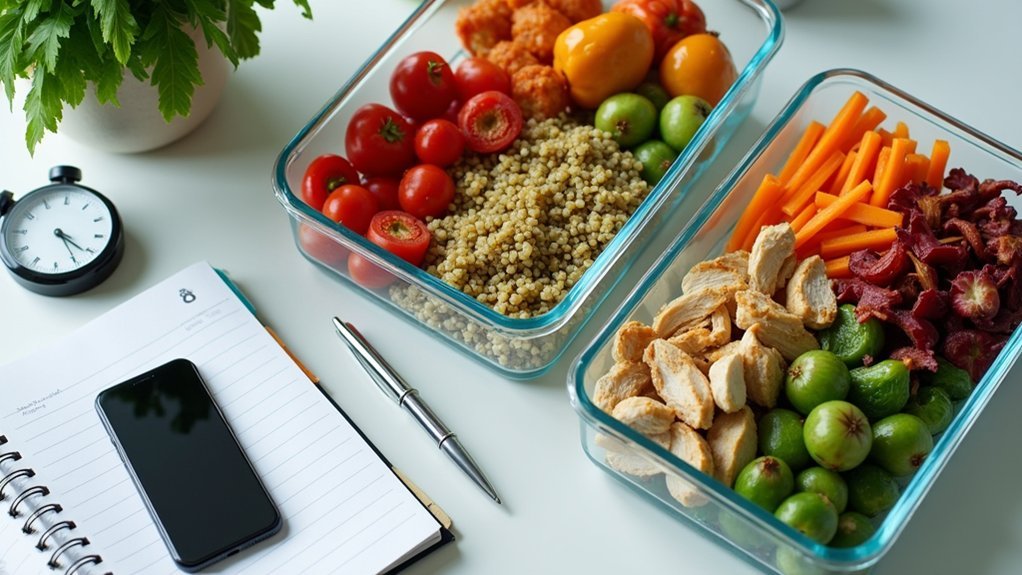
While ADHD presents unique challenges in meal planning, understanding these obstacles is the first step toward developing effective strategies. Your executive function skills can make planning and preparing meals feel overwhelming, leading to decision fatigue and impulsive food choices. ADHD-friendly meal planning requires recognizing how emotional dysregulation and medication effects impact your eating patterns.
Meal prepping becomes essential in managing these challenges. By creating structured approaches that account for your specific ADHD-related difficulties, you can develop healthy eating habits. Focus on simplifying meal planning tips that reduce cognitive load, such as creating template meal plans, using pre-chopped ingredients, and establishing consistent meal preparation routines. These strategies can help you navigate the complexities of nutrition while working with, not against, your neurodivergent brain.
The Balanced Meal Formula for Focus and Energy
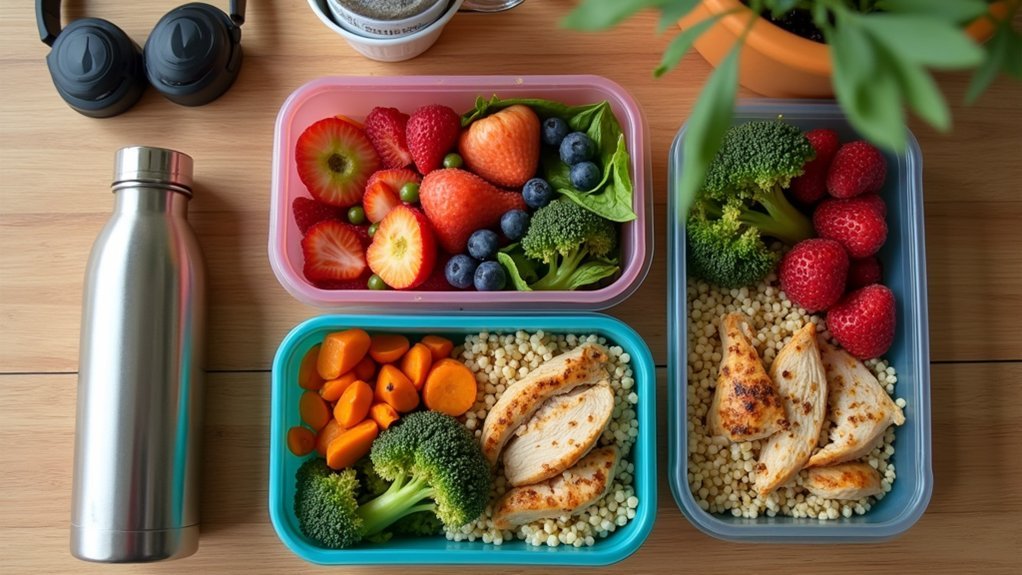
Because nutrition plays a critical role in managing ADHD symptoms, the Balanced Meal Formula offers a strategic approach to fueling your brain and body for peak performance. By pairing high fiber carbohydrates, protein sources, and vegetables, you’ll create ADHD-friendly meals that stabilize energy and enhance focus. This structured meal planning technique simplifies decision-making and reduces mealtime stress, making it easier to maintain consistent nutrition.
Your meal preparation becomes more intentional when you design meals using this formula. Think avocado toast with a fried egg or grilled salmon with rice and vegetables. Develop a strategic grocery list that supports this approach, ensuring you have ingredients for balanced meals. By prioritizing nutrient-dense combinations, you’ll combat energy dips and support sustained concentration throughout your busy day.
Grocery Shopping Strategies for ADHD Brains
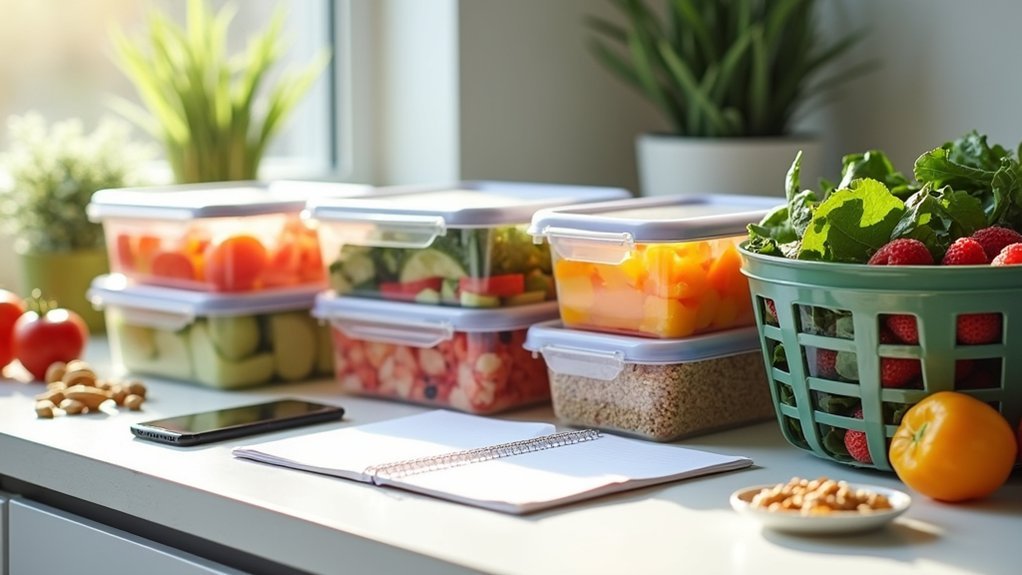
How can you transform grocery shopping from a chaotic experience to a strategic mission? For ADHD brains, meal planning requires intentional strategies that minimize decision-making stress. Consider these approaches:
- Use grocery shopping apps like AnyList to organize lists by store sections
- Prioritize nutrient-dense, quick and easy packaged foods
- Opt for frozen meals that reduce prep time and minimize waste
When shopping, focus on versatile ingredients that create multiple meal options with minimal effort. Frozen produce offers nutritional benefits while preventing spoilage, and pre-cut vegetables or rotisserie chicken can streamline your grocery shopping experience. Online grocery platforms can further simplify the process, allowing you to thoughtfully plan meals without store distractions. By implementing these targeted strategies, you’ll navigate grocery shopping more efficiently and reduce overwhelm.
Meal Prep Hacks to Simplify Your Routine
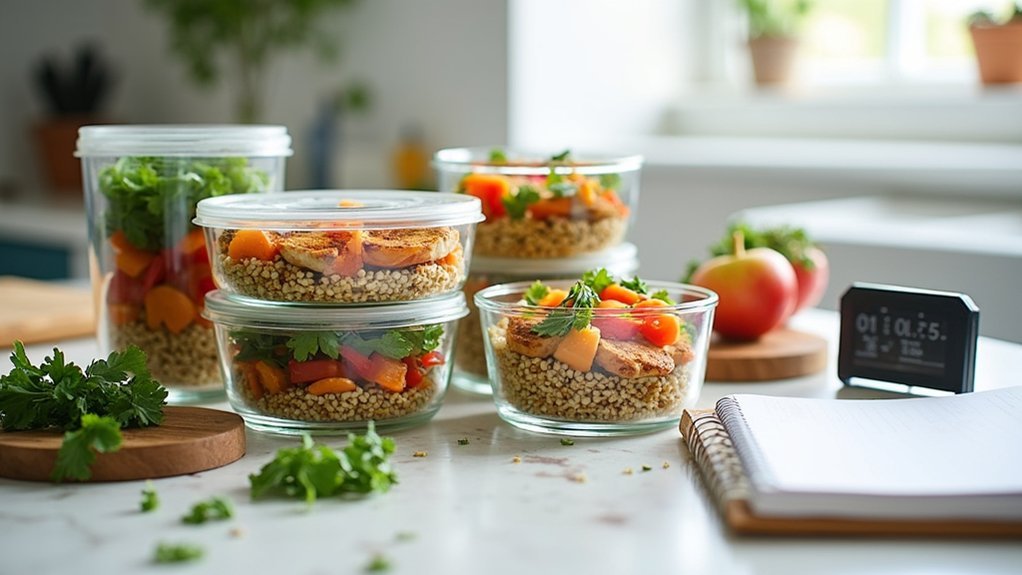
Meal prep transforms chaotic weeknight dinners into streamlined, stress-free experiences for busy professionals. By implementing strategic ADHD-friendly meal planning techniques, you’ll reduce decision fatigue and create easy meals that support your nutritional needs. Start by bulk prepping protein sources and staple ingredients at the beginning of each week, utilizing tools like Instant Pots or slow cookers to prepare large quantities efficiently. Invest in categorized meal prep containers that make grabbing balanced meals intuitive, and create a visual grocery store list displayed prominently in your kitchen. Schedule dedicated body doubling meal prep sessions twice weekly, which helps maintain consistency and minimizes the temptation to order takeout. These structured recipes and preparation strategies will simplify your routine and support your professional lifestyle.
Organization Tools and Checklists for Success
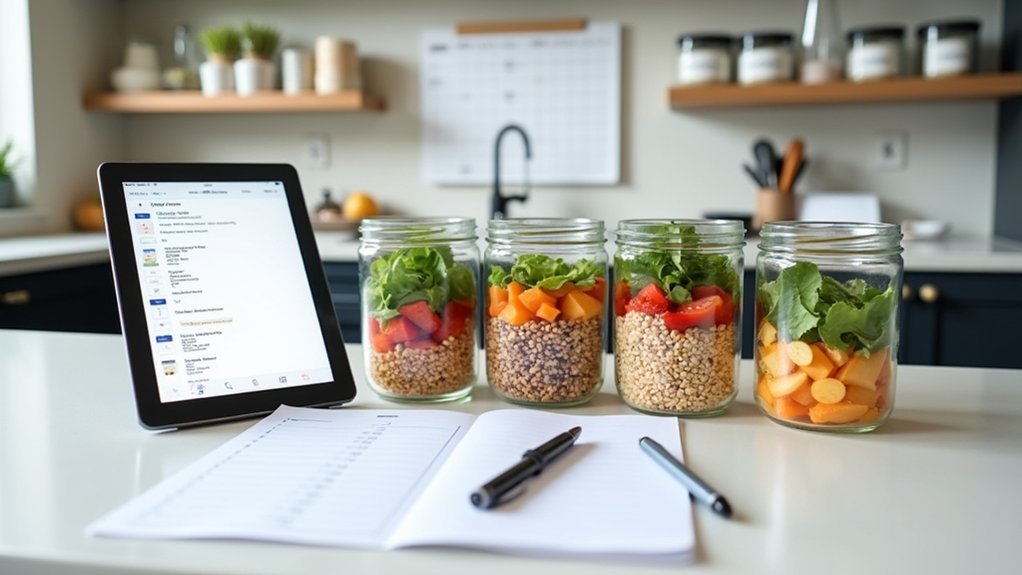
While effective meal preparation hinges on strategic planning, the right organizational tools can transform a scattered approach into a systematic, stress-reduced routine. Leveraging technology and visual strategies can greatly reduce decision fatigue during meal prep and grocery shopping for professionals with ADHD.
Key organization strategies include:
- Create grocery store section-based checklists that map out essential items systematically
- Utilize smartphone apps like AnyList for real-time, accessible meal planning tracking
- Maintain a refrigerator whiteboard with 6-10 simple, easy-to-prepare meal options
These checklists and tools streamline the meal preparation process, providing structure and minimizing cognitive overwhelm. By grouping items into categories like produce, staples, and frozen goods, you’ll guarantee thorough grocery shopping while reducing mental friction. Incorporating fool-proof recipes further simplifies your meal prep strategy, making consistent nutrition more achievable.
Quick and Easy Meal Ideas for Busy Professionals
Because time is a precious commodity for professionals juggling multiple responsibilities, strategic meal preparation becomes essential for maintaining nutrition and reducing daily stress. Embrace low-effort meals that streamline your cooking process, such as one-pan chicken and rice or no-cook salads topped with canned beans and pre-cooked quinoa. Utilize frozen vegetables and rotisserie chicken to create nutritious meals quickly, minimizing preparation time and cleanup.
Meal planning can be simplified by batch cooking chili or pasta, which can be portioned and frozen for convenient reheating. Keep your pantry stocked with healthy convenience foods like yogurt cups and single-serve snacks to guarantee you’ve always got a quick, nutritious option. These strategies transform meal preparation from a potential source of overwhelm into a manageable, efficient process.
Self-Care and Flexibility in Meal Planning
As professionals navigate the demanding landscape of career and personal responsibilities, self-care in meal planning emerges as a critical strategy for sustainable nutrition and mental wellness. For individuals with ADHD, meal planning requires a compassionate approach that prioritizes flexibility and low-effort solutions.
Key strategies include:
- Designating cooking-free days to recharge mental energy
- Scheduling bi-weekly meal prep sessions to balance convenience and nourishment
- Incorporating intentional breaks during cooking to prevent overwhelm
Embracing self-care means recognizing that deviating from your original meal plan isn’t a failure, but a form of adaptive thinking. By choosing simple, nourishing meals and allowing yourself grace, you can maintain healthy eating habits without added stress. The goal is to support your mental well-being while ensuring consistent, manageable nutrition.
Personalized Support and Resources for ADHD Nutrition
Recognizing the unique nutritional challenges faced by professionals with ADHD, personalized support becomes a strategic approach to sustainable meal planning. Working with a Registered Dietitian can help you develop tailored strategies that simplify healthy eating habits and reduce decision fatigue. These professionals offer practical advice for creating meal prep planners and organizing grocery lists that align with your individual preferences and dietary needs.
Smartphone apps and community resources provide additional support, offering insights from others who understand ADHD nutrition challenges. By leveraging these tools, you’ll develop structured meal planning systems that make healthy eating more manageable. Ongoing support through newsletters and online resources can further enhance your ability to maintain balanced nutrition while managing ADHD symptoms effectively.
Frequently Asked Questions
How to Meal Prep When You Have ADHD?
You’ll streamline meal prep by using visual grocery lists, batch cooking quick recipes, setting timer-based cooking sessions, prepping grab-and-go snacks, and organizing your kitchen to minimize distractions while creating structured, mindful eating strategies that support your focus.
What Is a Good Meal Plan for ADHD?
You’ll thrive with an ADHD meal plan that balances macros, prioritizes quick recipes, and manages portion control. Focus on nutrient-dense foods, plan consistent meal timing, and strategize grocery shopping to reduce stress eating and support cognitive function.
How Do You Meal Prep on a Busy Schedule?
Like a well-oiled machine, you’ll conquer meal prep by batch cooking proteins, leveraging planning tools, and using storage solutions. Focus on time-saving techniques, easy recipes, and smart grocery shopping to transform your weekly nutrition efficiently.
What Should ADHD People Eat for Dinner?
You’ll thrive on quick, protein-packed one-pan dishes like stir-fries with chicken and frozen veggies. Add quinoa, healthy fats, and flavor enhancers for comforting, nutritious meals that support focus and energy with minimal prep time.
Conclusion
Purposeful preparation paves the path to nutritional success. You’ve learned strategic meal planning isn’t just about food—it’s about empowering your ADHD brain with sustainable, stress-reducing strategies. By implementing these targeted techniques, you’ll transform mealtime from overwhelming to manageable. Remember, consistency trumps perfection; small, deliberate steps create lasting habits. Your nutrition can become a powerful tool for focus, energy, and overall well-being.

